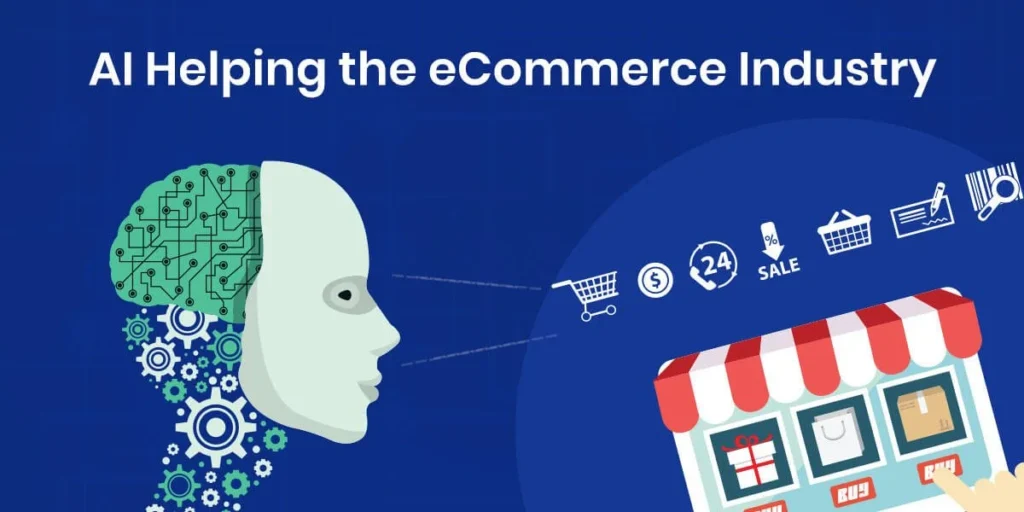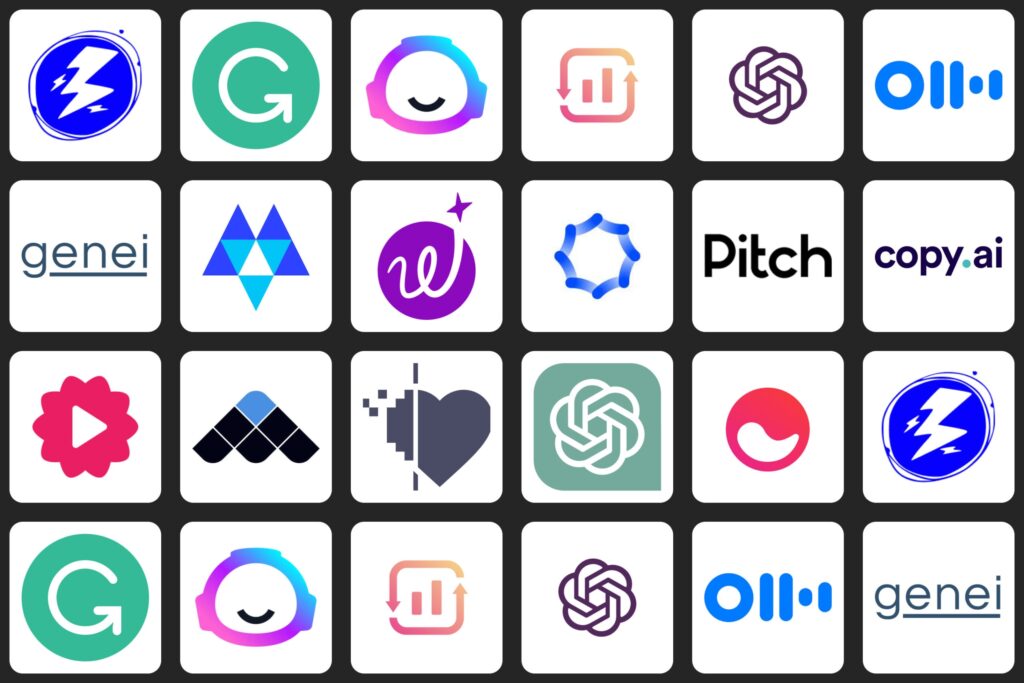As an online business owner, ensuring an engaging customer experience is a necessity. Users are now more aggressive than ever. The interactive offers and engaging user experience have changed the way users shop.
But what brought in this shopping revolution?
The age of Artificial Intelligence (AI). It not only changed the way users interact during their shopping journey but also their entire support experience. Embracing this revolution is the future of online retail. AI Ecommerce Tools are revolutionizing the way businesses operate, enhancing user experience and driving sales. Artificial Intelligence for E-commerce is transforming the online retail industry by enabling personalized shopping experiences. The Best AI Tools for Online Retail are designed to improve decision-making, based on real-time consumer data.
Businesses are incorporating AI to improve customer support and overall shopping experience. A lot of recurring processes need to be taken care of by AI, freeing time for creativity to bloom. E-commerce Automation Tools have become essential for scaling online businesses by reducing manual work and errors. AI Solutions for E-commerce Businesses offer a competitive advantage by enabling data-driven decisions and insights.
But how does one decide which AI Ecommerce tools are the best choice?
Well, there’s yet to be any answer to this question. The best tools are the ones that align with your target goals and are easy to incorporate. Machine Learning in Online Shopping is transforming the way businesses personalize their offerings to individual customers. With AI Ecommerce Tools, retailers can automate tasks such as inventory management, customer service, and marketing.
Let’s take you on a journey where we’ll help you choose the best AI tools for your E-commerce platform. Here are the 13 Revolutionary AI Ecommerce tools you can choose from:
1. ManyChat – The Chatty Charm in Your Cart
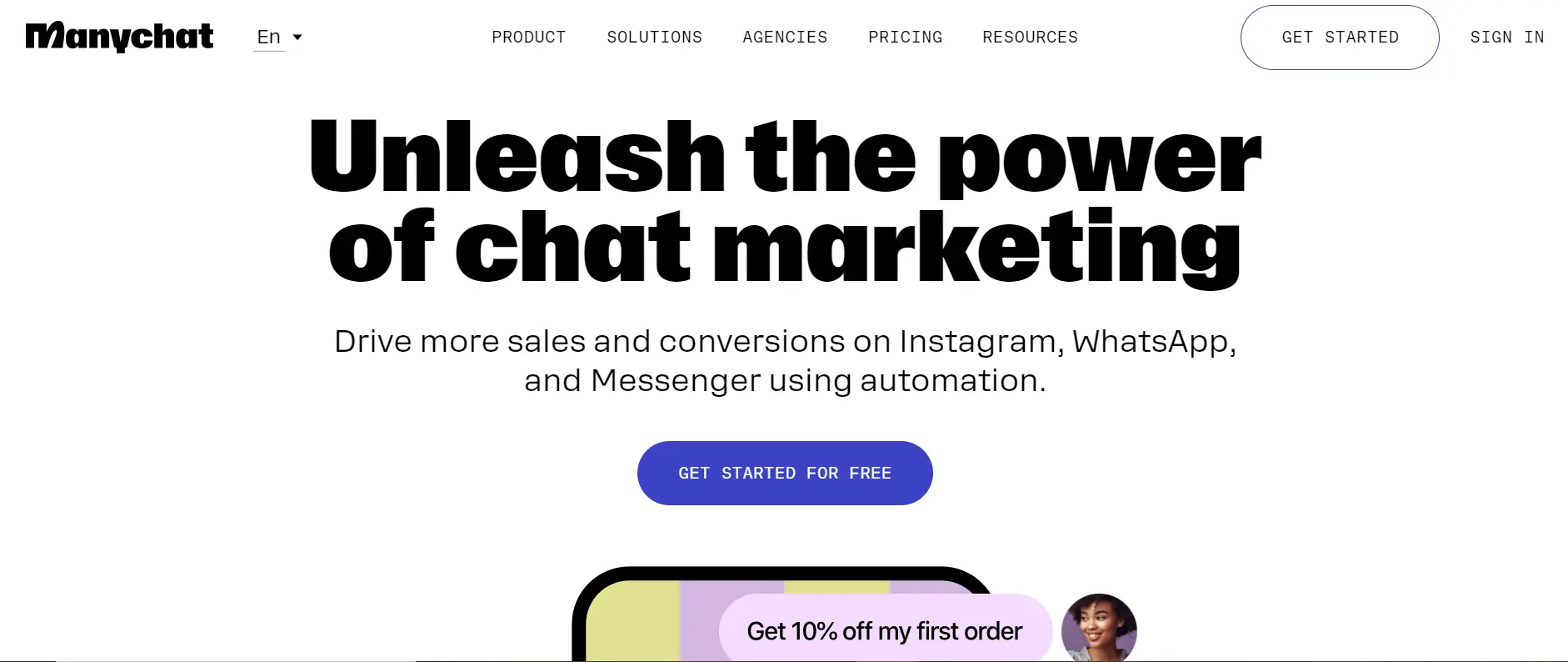
Have you ever wished your online shopping cart could strike up a conversation? Enter ManyChat, the chatbot wizard that turns your browsing session into a full-blown discussion. It’s like having a shopping buddy who knows your taste better than your BFF. Retailers using Artificial Intelligence for E-commerce can enhance customer support with AI-powered chatbots that provide instant responses. Incorporating the Best AI Tools for Online Retail allows businesses to streamline inventory management and logistics. Using E-commerce Automation Tools, retailers can automate everything from marketing campaigns to order fulfillment.
Pros
- Transforms mundane transactions into lively conversations.
- Ensures round-the-clock availability
- Allows businesses to personalize interactions
Cons
- Occasionally, ManyChat may misinterpret customer queries or preferences
- There’s a risk of ManyChat becoming overly chatty
- Lacks the nuanced emotional understanding of human interactions
Benefits for Businesses
- Enhanced Customer Service
- Increased Accessibility
- Data-Driven Personalization
2. Drift – Where Chatbots Learn Stand-up Comedy
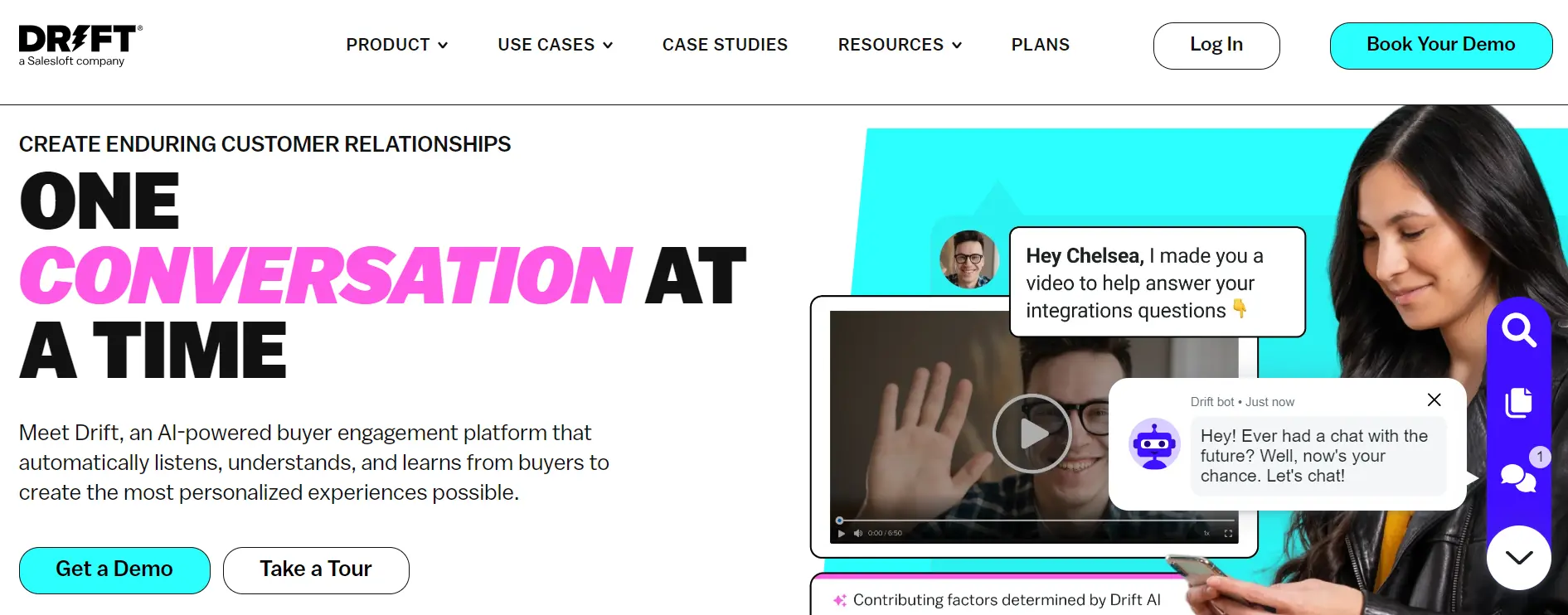
Drift is not just a chatbot but your e-commerce stand-up comedian. Imagine you’re browsing for a new pair of shoes. And Drift cracks a joke about your old sneakers being so last season. Who said shopping can’t be a laugh fest?
Pros
- Injects humour and entertainment into customer interactions
- Interactive Customer Engagement
- Allows businesses to infuse their brand with personality and humour. It helps to create a distinct brand persona.
Cons
- Subjectivity of Humor
- Overindulgence in comedy might distract users from their original intent
- Continuous exposure to Drift’s comedic approach may lead to humour fatigue
Benefits for Businesses
- Differentiation through Brand Personality
- Increased User Engagement
- Positive User Perception
3. Dynamic Yield – The Virtual Personal Stylist
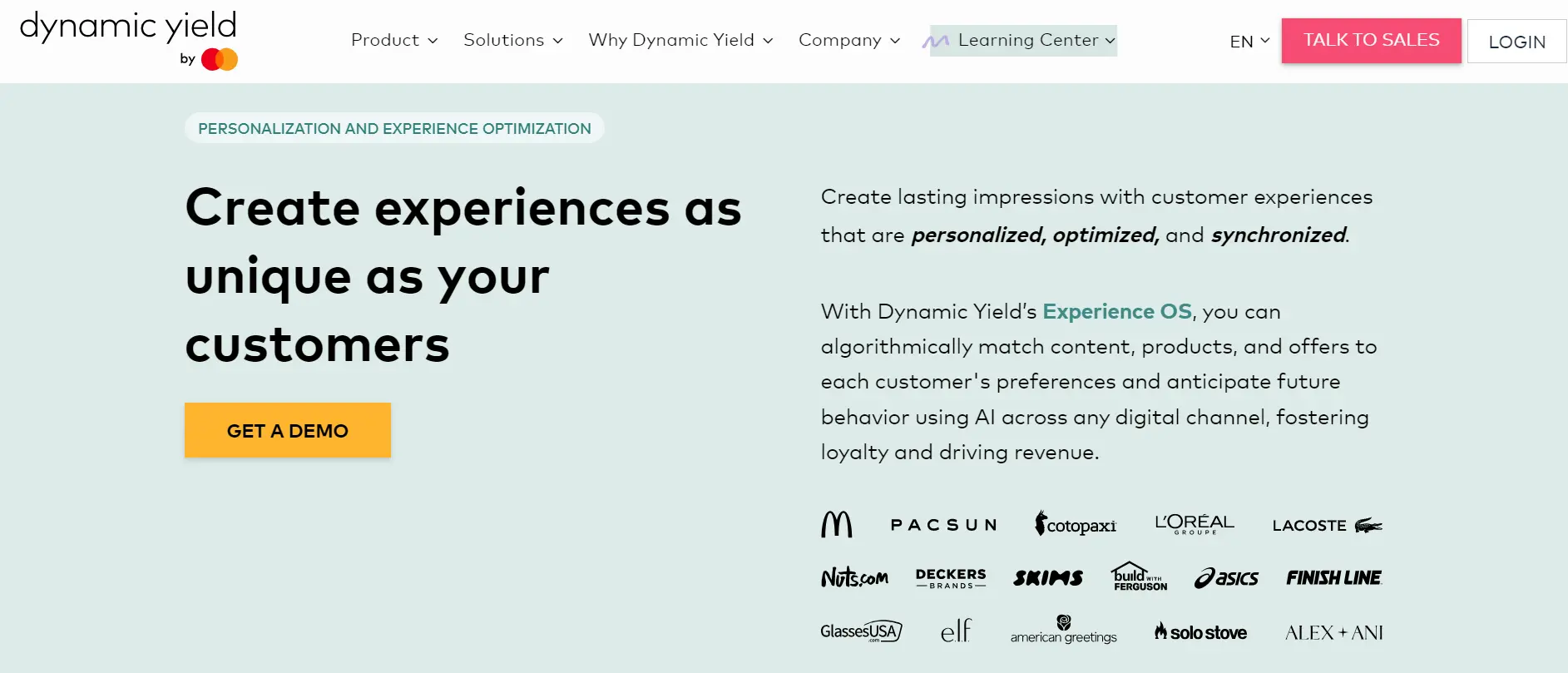
Dynamic Yield isn’t your average personalization engine. It’s the fashionista of the AI world. It analyses your preferences. And suggests outfits with the expertise of a seasoned stylist. Say goodbye to fashion errors!
Pros
- Operates as the Coco Chanel of personalization engines
- Analytics prowess translates into spot-on product suggestions
- Trendsetting Capabilities
Cons
- Occasionally stumble, suggesting items that don’t perfectly align with customer preferences.
- It might hover too closely, bombarding users with suggestions.
- Risk of overshadowing other aspects of the shopping experience.
Benefits for Businesses
- Enhanced Customer Satisfaction
- Increased Conversion Rates
- Brand Leadership in Style
4. Adobe Target – A/B Testing, or A/B Fest?

Adobe Target is the ultimate A/B testing maestro, but it doesn’t stop there. It turns testing into a festival, making sure your users get the party favour they genuinely desire. Think of it as the magic remote controlling the Personalization game for e-commerce. AI Solutions for E-commerce Businesses help personalize shopping experiences by analyzing consumer behavior and preferences. Machine Learning in Online Shopping enables real-time product recommendations, enhancing the shopping experience. Artificial Intelligence for E-commerce is being used to create customized marketing strategies that resonate with individual shoppers. With the Best AI Tools for Online Retail, businesses can leverage machine learning algorithms to predict demand and optimize stock levels.
Pros
- Can help refine and optimize their digital strategies by experimenting with different variations
- Offers sophisticated personalization capabilities
- Provides businesses with a wide array of targeting tools.
Cons
- Implementing and fully leveraging the platform’s capabilities may require training and expertise.
- The comprehensive nature can be resource-intensive in terms of time and technology infrastructure.
- The pricing structure may be a limiting factor for smaller businesses with budget constraints.
Benefits for Businesses
- Empowers businesses to make data-driven decisions
- Contribute to an improved customer experience.
- Facilitates the creation of optimized user journeys.
5. Barilliance – When Your Cart Becomes a Crystal Ball
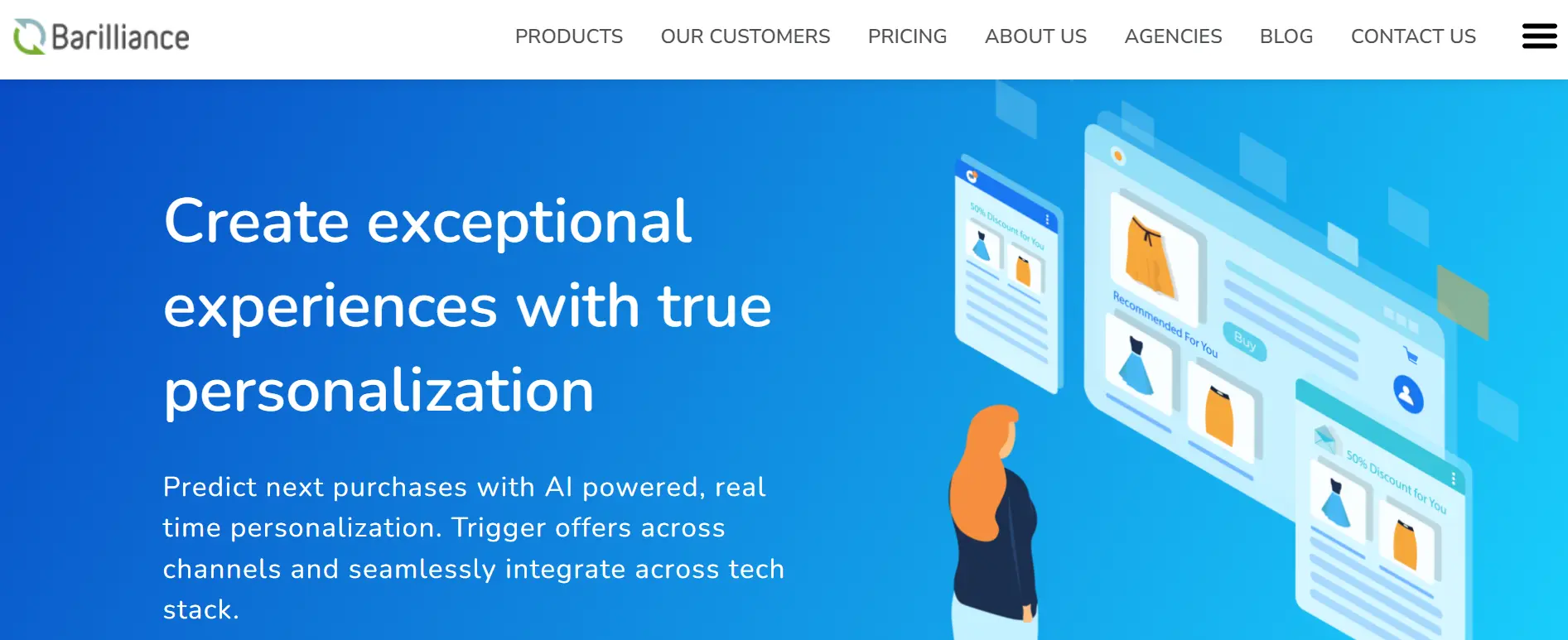
Have you ever wished your shopping cart could predict what you want before you even know it? Barilliance is here to make your dreams come true. It’s the AI crystal ball that magically fills your cart with items you didn’t know you needed—until now. By using E-commerce Automation Tools, businesses can manage customer inquiries automatically, improving support efficiency. By integrating AI Solutions for E-commerce Businesses, retailers can improve product recommendations and increase sales conversions. Machine Learning in Online Shopping improves customer service by automating responses and providing personalized assistance.
Pros
- Specializes in personalized product recommendations and e-commerce personalization.
- The personalized product recommendations can significantly boost conversion rates.
- Advanced Behavioral Targeting
Cons
- Implementation and integration into existing e-commerce systems may pose challenges.
- Implementation and utilization may be limited for smaller businesses with budget constraints.
- Relies heavily on algorithms to generate personalized recommendations.
Benefits for Businesses
- Create a more engaging and relevant shopping experience.
- Increased Customer Loyalty
- Data-Driven Marketing Strategies
6. Nosto – AI-Powered Personalization Magic for Business Growth
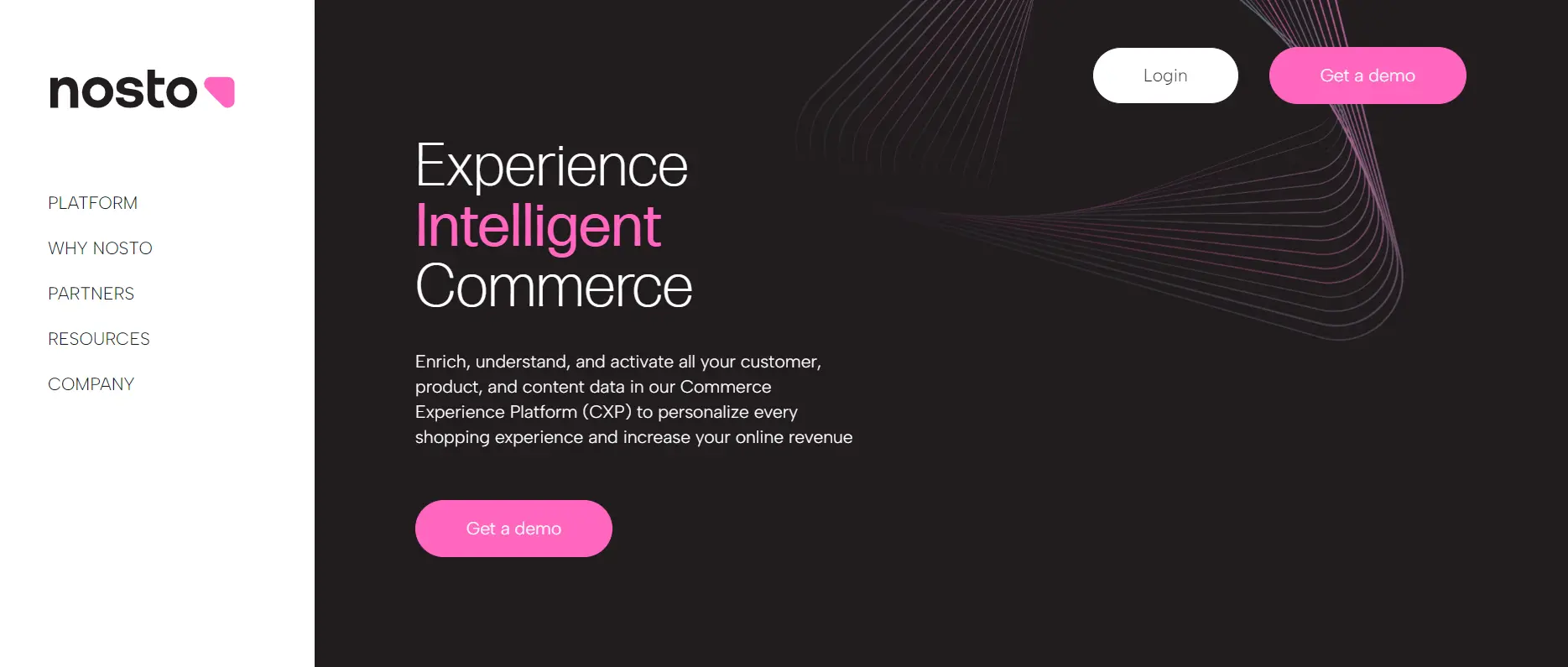
Nosto functions as a magical curator for your online shopping pursuits. It works like magic to refine your shopping experience. It works like magic to carefully select items for your cart. AI Ecommerce Tools offer a competitive edge by providing businesses with smarter and more efficient operations. Businesses embracing Artificial Intelligence for E-commerce are positioned to stay ahead of the competition in a rapidly evolving market. The Best AI Tools for Online Retail make it possible to improve customer interactions by offering more personalized services.
Pros
- Create dynamic and real-time recommendations based on user behavior.
- Increased Conversion Rates
- Enables businesses to maintain consistency in personalized experiences across multiple channels.
Cons
- The cost of a subscription may be a consideration for businesses with limited budgets.
- Implementing and fully leveraging may require businesses to navigate the learning curve.
- Highly dependent on the quality and accuracy of customer data.
Benefits for Businesses
- Enhances customer engagement by delivering content and recommendations that align with individual preferences.
- The ability to provide personalized and relevant suggestions fosters customer loyalty.
- Empowers businesses with valuable insights derived from customer interactions.
7. Algolia – Voice Search that Speaks Fluent Chic
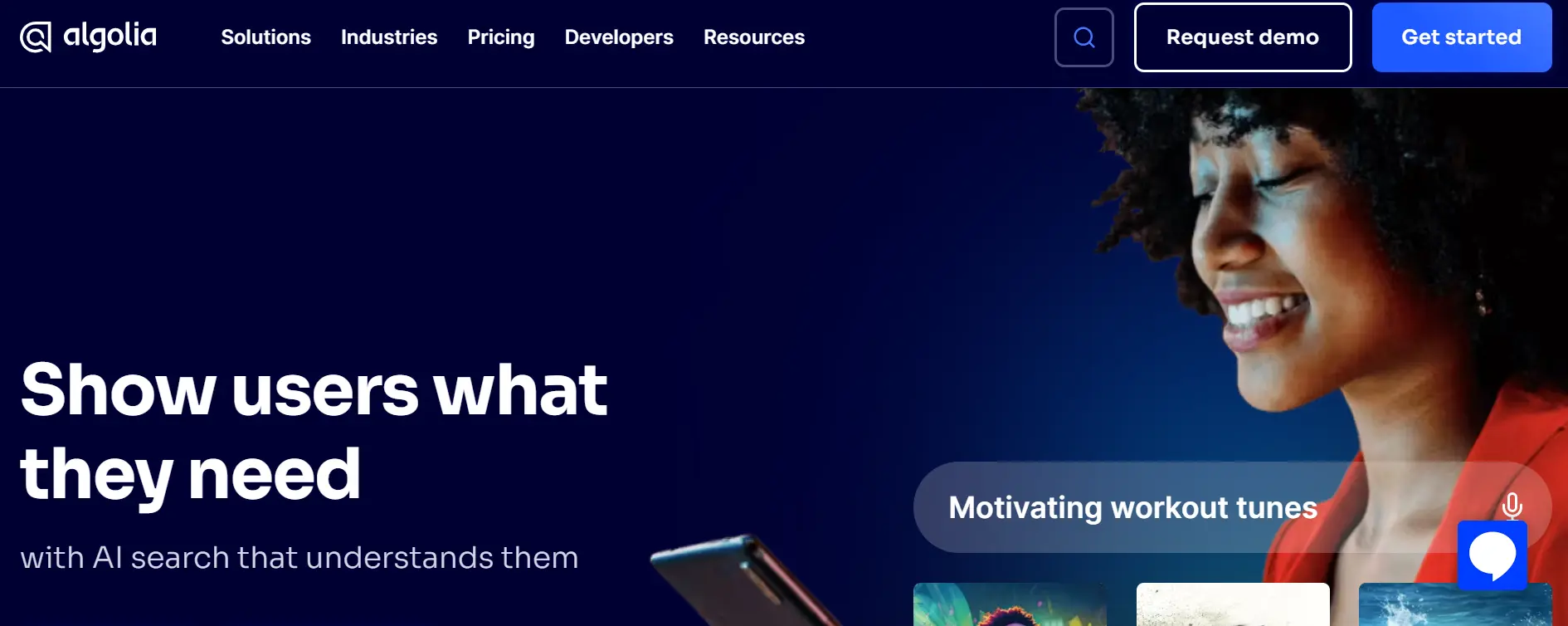
Algolia takes voice search to a whole new level, making Siri sound like a fashion noob. Imagine asking your device for the latest trends, and Algolia responds with runway-worthy suggestions. Who needs a personal assistant when you’ve got Algolia?
Pros
- Renowned for its powerful and lightning-fast search capabilities.
- Enable businesses to offer a cutting-edge and user-friendly voice search experience.
- Provides businesses with a flexible and scalable search solution.
Cons
- Excelling its advanced features may require a learning curve.
- Cost Considerations for High Usage
- Relies on internet connectivity for optimal performance.
Benefits for Businesses
- Improved User Satisfaction and Retention
- Enhanced Accessibility with Voice Search
- Scalable and Customizable Solution
8. Bluecore – Predictive Analytics: The Fashion Psychic
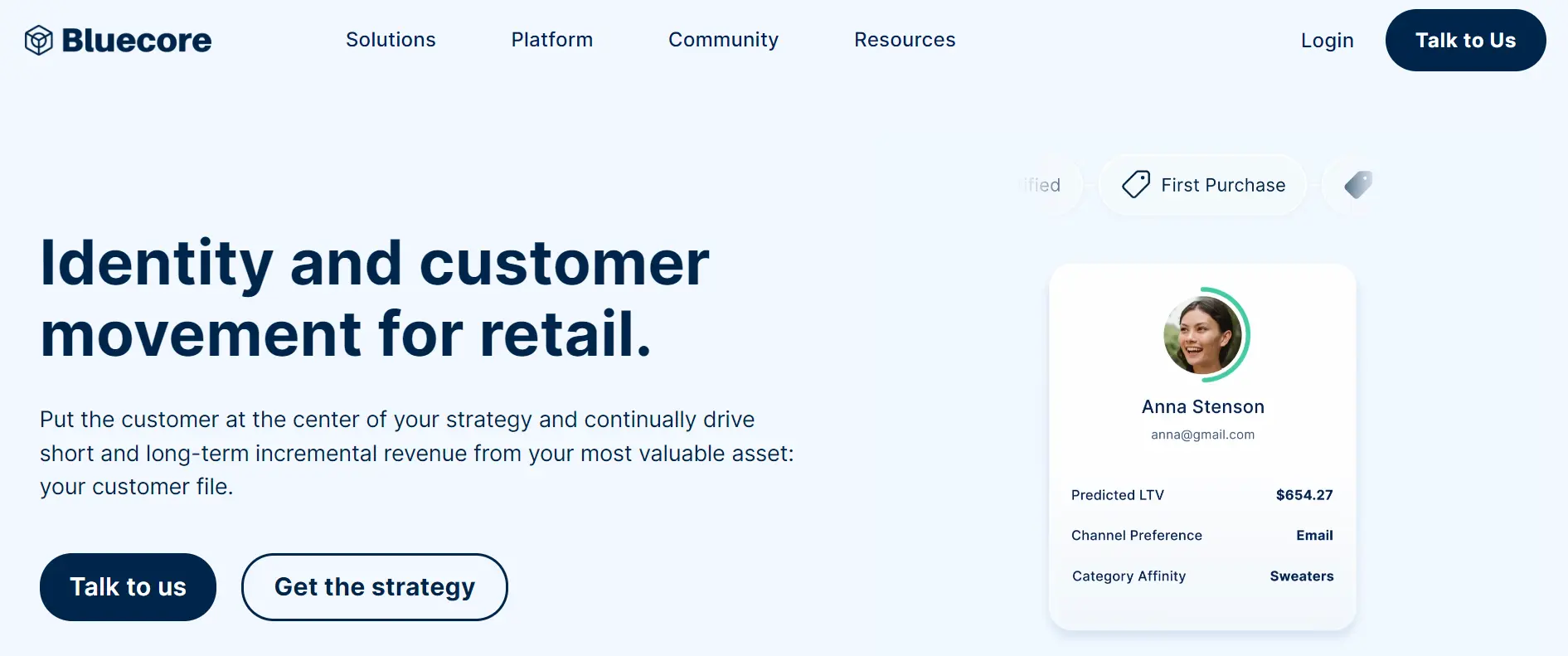
Have you ever wished your inbox could predict your next shopping spree? Bluecore is the fashion psychic. It uses predictive analytics to send you emails so perfectly timed you’d think it has a crystal ball into your wardrobe desires. E-commerce Automation Tools are integral in scaling operations, allowing businesses to handle more customers without increasing overhead. Implementing AI Solutions for E-commerce Businesses is key to achieving long-term success in the fast-evolving online retail space.
Pros
- Excels in AI-driven personalization
- Specialise in automated triggered email campaigns based on user behavior.
- Predictive analytics capabilities provide businesses with valuable insights into future customer behavior.
Cons
- Integrating Bluecore into existing systems may pose challenges for some businesses.
- Implementation and subscription may be a consideration for businesses with limited budgets.
- Relies on the quality and accuracy of customer data.
Benefits for Businesses
- Enhances customer engagement by delivering content and offers tailored to individual preferences.
- Efficient and Timely Marketing Automation
- Predictive analytics empower businesses with data-driven insights.
9. Forter – Keeping Fraud at Bay with a Sense of Humor
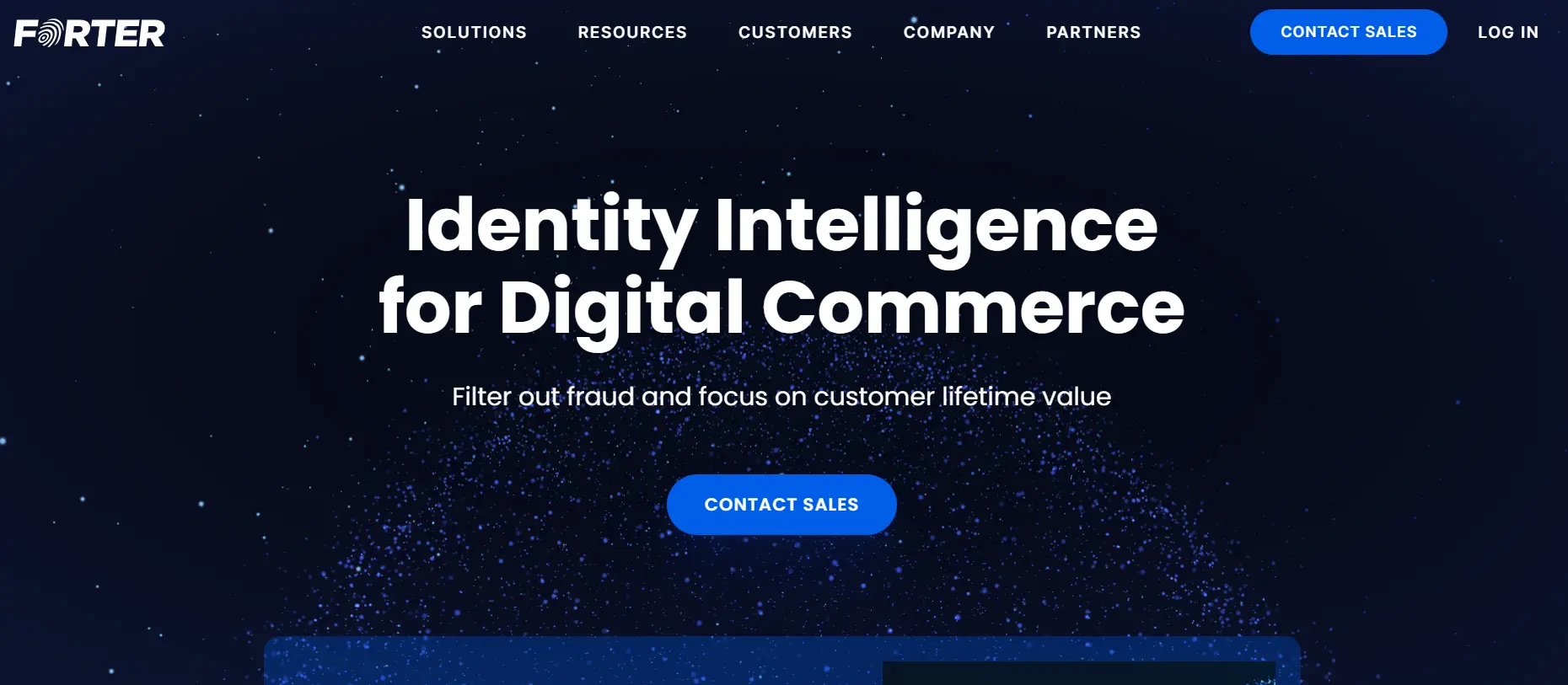
Forter takes fraud detection seriously, but its sense of humour is no joke. It’s the AI superhero protecting your online shopping kingdom from the villains of the digital world. Think of it as your e-commerce Batman but with more memes. Machine Learning in Online Shopping enables businesses to gather actionable insights from customer data, leading to smarter decision-making.
Pros
- Specialize in real-time fraud prevention, leveraging advanced ML algorithms to analyze transactions.
- Offers a Frictionless Customer Experience
- Allows benefit from collective knowledge, improving the accuracy and efficiency of fraud detection.
Cons
- They come at a significant cost.
- It relies on the accuracy and relevance of the data it receives.
- Limited Customization for Some Businesses
Benefits for Businesses
- Revenue Protection with Proactive Fraud Prevention.
- Enhanced Trust and Customer Loyalty
- Access to Collective Fraud Knowledge
10. Riskified – Where Fraud Detection is a Sherlock Holmes Mystery
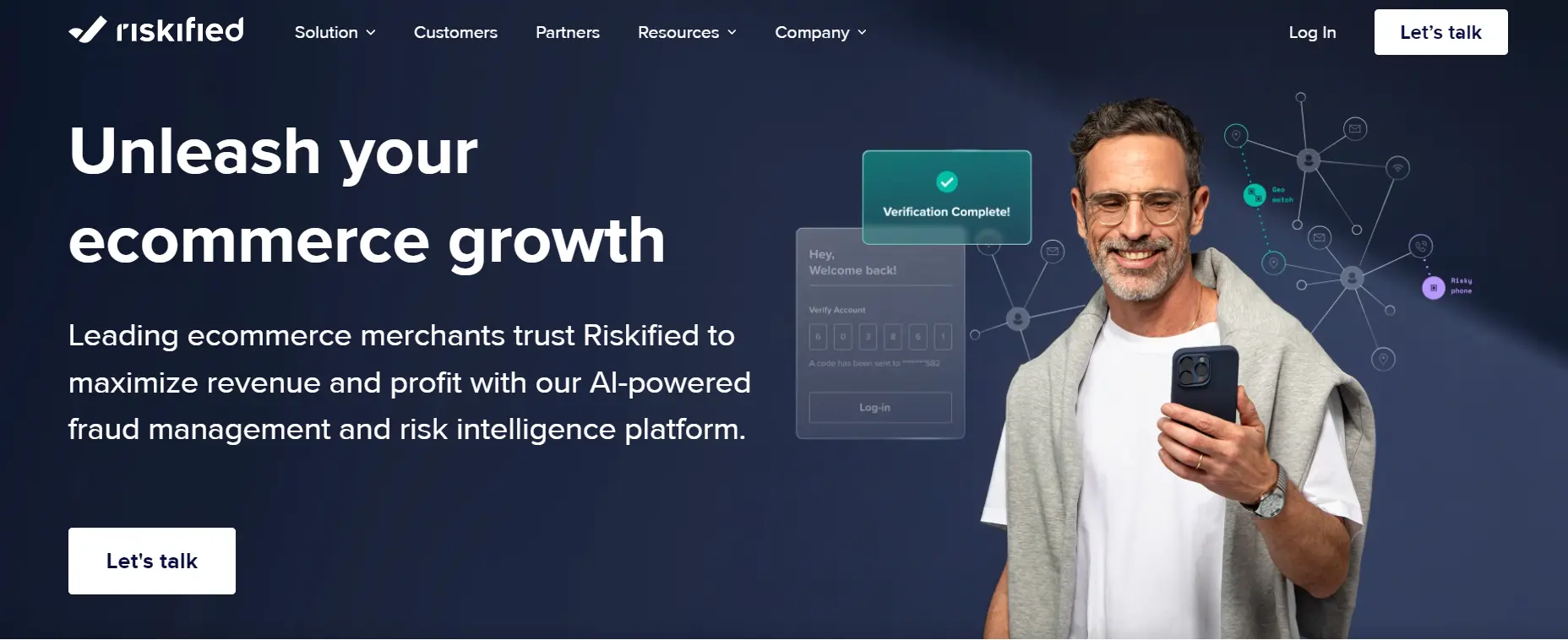
Riskified turns fraud detection into an intriguing Sherlock Holmes mystery. It analyses every transaction with the precision of a detective solving a crime.
Pros
- Offers a comprehensive approach to fraud prevention, utilizing machine learning and behavioral analytics.
- Assess the risk associated with transactions.
- Guaranteed Approvals and Chargeback Protection.
- Offer customization options aligned with their specific industry challenges, transaction patterns, and risk tolerance levels.
Cons
- Assess the financial implications of integrating Riskified into their systems.
- There’s a possibility of false positives where legitimate transactions are flagged as fraudulent.
- It relies on the quality and relevance of the data it receives.
Benefits for Businesses
- Financial Security with Guaranteed Approvals
- Chargeback Protection for Business Stability
- Tailored Solutions for Industry-Specific Needs
11. IBM Watson Assistant – Your AI Shopping Sidekick
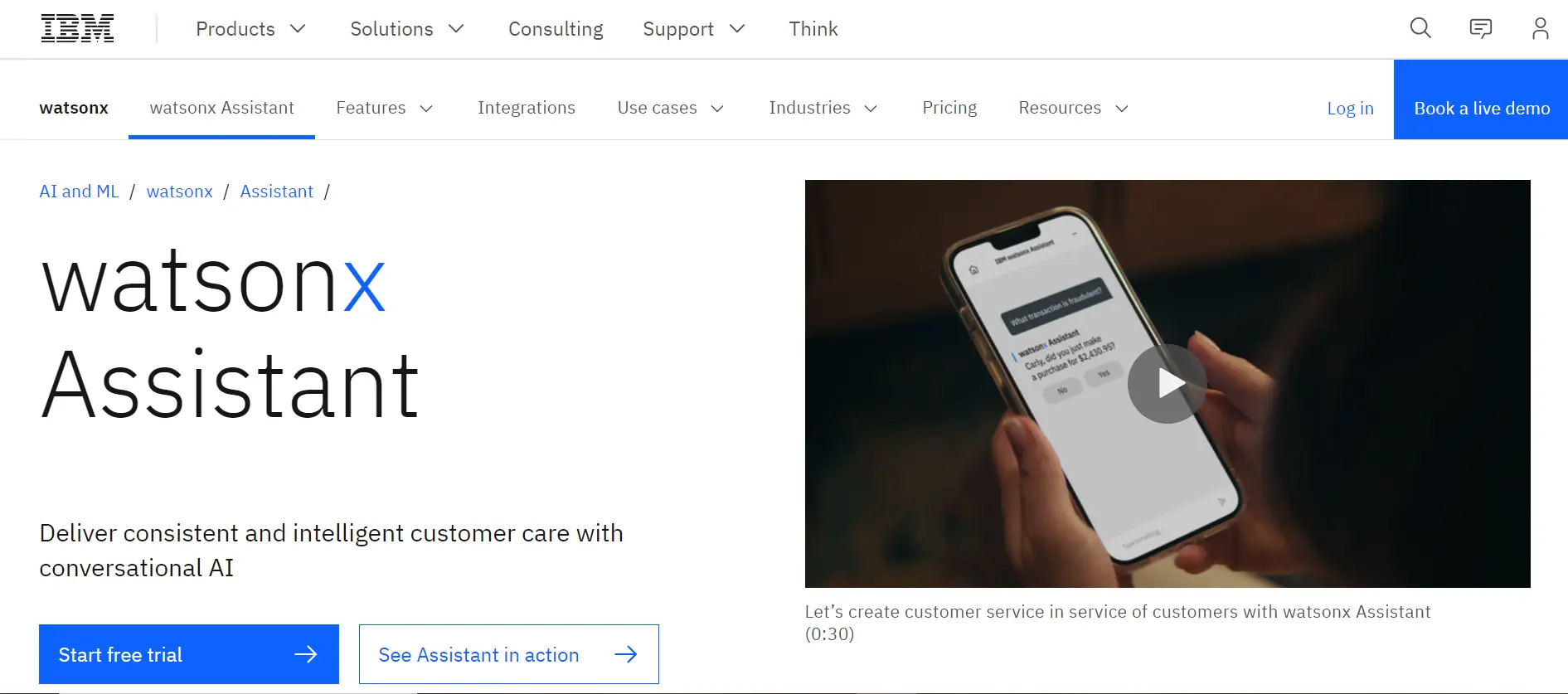
Imagine having a shopping assistant that is smarter than your smartphone. IBM Watson Assistant is your AI best friend who knows your shopping history. It understands your preferences and never judges your impulse buys.
Pros
- Advanced Natural Language Processing
- Allow businesses to deploy their virtual assistants across various platforms and communication channels.
- Integration with IBM Cloud Services.
Cons
- Implementing highly customized solutions with IBM Watson Assistant may require complex technical expertise.
- Cost Considerations for Large-Scale Use
- Training Complexity for Specific Industries
Benefits for Businesses
- Enhanced User Experience with Natural Language Understanding
- Consistent Multi-Channel Interactions
- Comprehensive Integration for Expanded Capabilities
12. Bold360 – Virtual Assistants that Don’t Do Small Talk
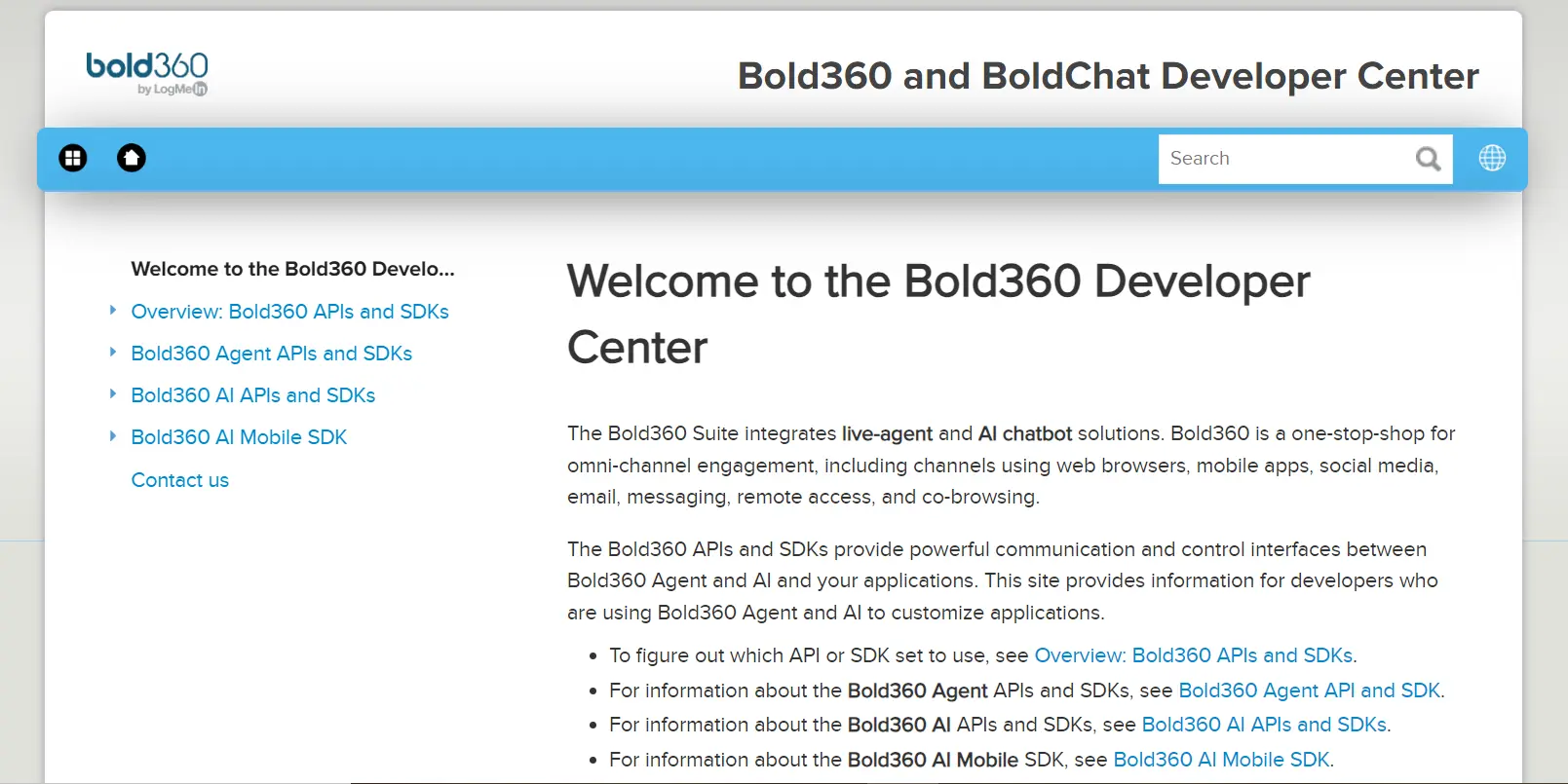
Bold360’s virtual assistants are away for small talk. They’re here to assist with military precision. Whether you need help finding the perfect gift or tracking your order, Bold360’s bots are the unsung heroes of the e-commerce customer service universe.
Pros
- Offers a unified platform for customer engagement, integrating live chat and AI-powered chatbots.
- Incorporates AI-powered chatbot capabilities.
- Provides data-driven insights into customer interactions.
Cons
- Learning Curve for Advanced Features
- Cost Considerations for Scalability
- Dependency on Internet Connectivity
Benefits for Businesses
- Efficient and Seamless Customer Engagement
- 24/7 Availability with AI-powered chatbots
- Informed Decision-Making with Data-Driven Insights
13. Phrasee – Email Marketing with a Dash of Sass
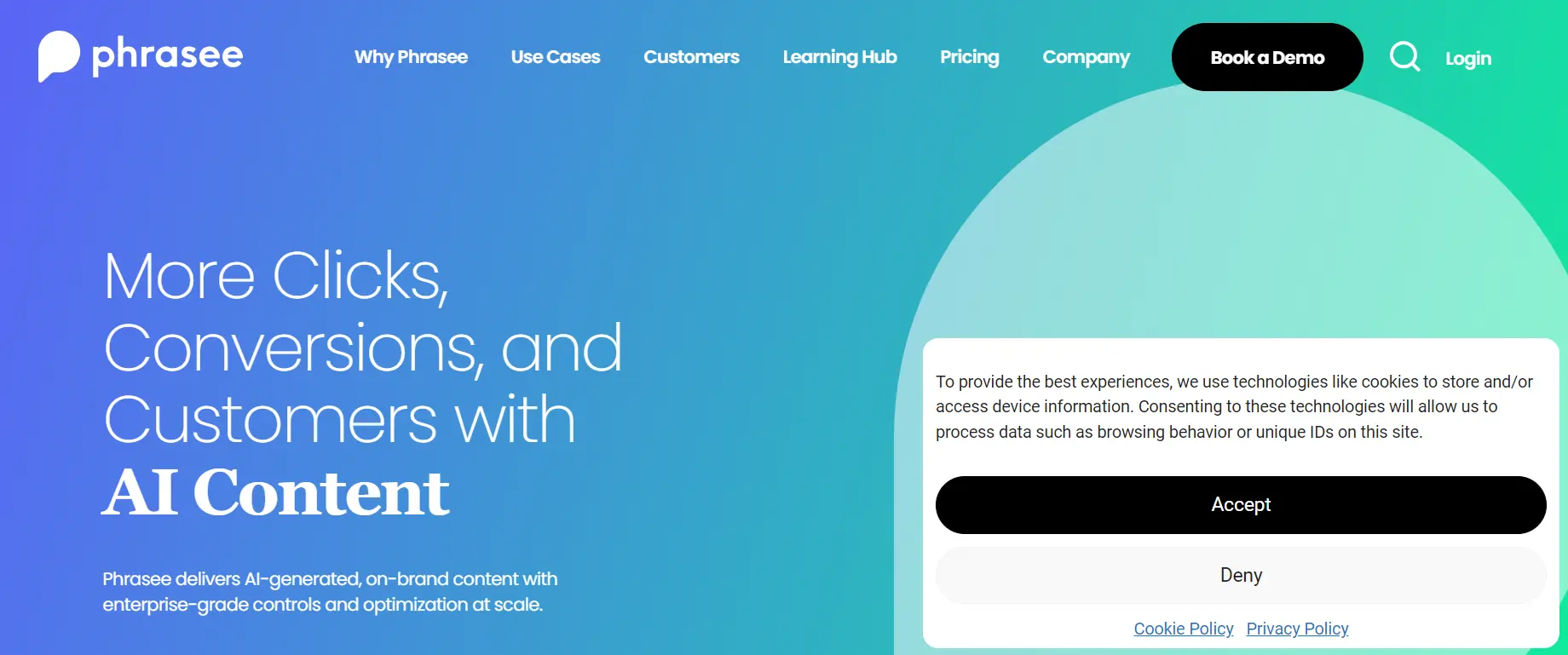
Phrasee turns email marketing into an expressive masterpiece. It’s the Shakespeare of subject lines, crafting emails that not only sell but also entertain. Who knew AI could have such a way with words?
Pros
- Leverages artificial intelligence to optimize email copy for better engagement.
- Automates A/B testing processes for email campaigns, saving time and resources.
- Helps maintain consistency in brand voice across email campaigns.
Cons
- Cost Considerations for Advanced Features.
- Learning Curve for Optimization.
- Dependency on Data Quality.
Benefits for Businesses
- Increased Email Engagement and Conversions
- Efficient A/B Testing for Quick Insights
- Brand Consistency for Stronger Identity
Find more valuable information in the given below blogs:
AI-powered chatbots act as virtual assistants. They provide instant and personalised responses to customer queries. They enhance engagement and offer real-time support, guiding users through product selection. They even assist in the checkout process. AI-driven recommendation engines analyse customer behaviour and preferences to suggest personalised product recommendations. This improves the customer shopping experience. They also increase the likelihood of upselling and cross-selling, boosting overall sales. AI tools can optimise supply chain operations. They can predict demand, streamline inventory management, and enhance logistics. This results in improved efficiency, reduced costs, and a more responsive supply chain. It ensures products are available when and where customers need them. AI employs advanced algorithms to analyse patterns and detect anomalies in transaction data. This proactive approach helps identify and prevent fraudulent activities. They ensure a secure online shopping environment for both businesses and customers. AI enables businesses to analyse customer data, understand preferences, and deliver personalised experiences. They take care of everything from personalised product recommendations to tailored marketing messages. AI ensures that each customer feels like they are navigating a unique and engaging online store.FAQs
1. What role do AI-powered chatbots play in enhancing customer engagement on e-commerce websites?
2. How can AI-driven recommendation engines benefit my e-commerce business?
3. What impact can AI have on supply chain management in the e-commerce industry?
4. How does AI contribute to fraud detection and prevention in online transactions?
5. Can AI tools help in creating a more personalised and immersive shopping experience?
